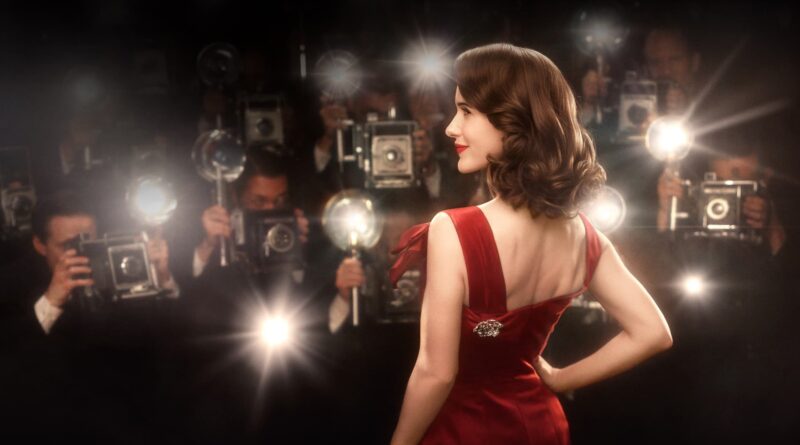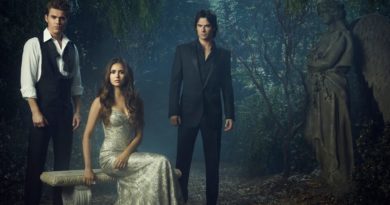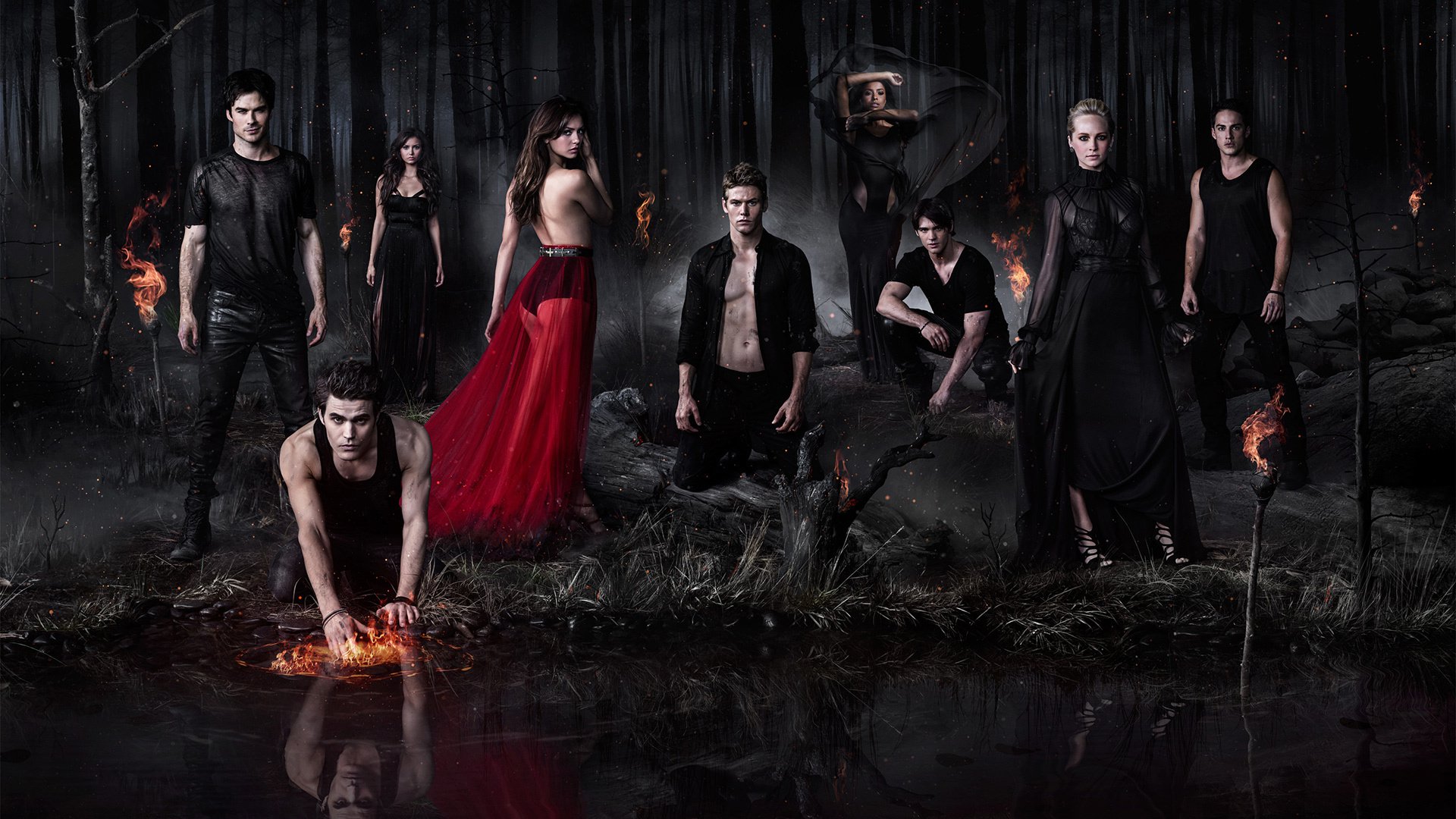The Most Popular Music from The Marvelous Mrs. Maisel: A Farewell with Robin Urdang
The Marvelous Mrs. Maisel began its illustrious run in March of 2017 and has charmed audiences and critics during its 5 seasons. The series finale gracefully made its way onto screens on May 26, 2023, and has received bittersweet praise. Following the titular character Miriam “Midge” Maisel, the series tells the story of her pursuit of a career in stand-up comedy after realizing she has a talent for it.

Mrs. Maisel consistently deployed needle drops in a unique and poignant manner that quickly became a part of the series’ DNA. As we bid farewell, Tunefind spoke with the series’ award-winning music supervisor Robin Urdang, about her work on the distinguished soundtrack and the magic of its final season.
When asked what her favorite part of working on The Marvelous Mrs. Maisel was and if she is satisfied with how the series is ending, Robin emphasized her love of the entire series while explaining how in her opinion, show creators Amy Sherman-Palladino and Daniel Palladino delivered a great ending.
Robin Urdang: I am super sad to see it go. I’ve been so lucky to work with the Palladinos again, the incredible cast, crew, and music team, on a hugely successful show and work with music that I can listen to 24/7. I would never be satisfied with how it ends because I never wanted it to end. But in truth, Amy and Dan did a magnificent job in the last season. Keeping the most important relationship alive by not making Midge and Susie’s life picture-perfect leaves the audience asking for more.
Urdang explained how she has enjoyed seeing the fans respond to the finale and believes the audiences’ investment in the fictional world is a testament to the show’s ability to tell a story and develop meaningful characters.
RU: I’ve been seeing so many fun questions on social media asking things like, “What happened to Rose? How did she die?”, “Where is Joel?”, “How come Moishe wasn’t at the Gordon Ford show?” and so many other interesting responses. These characters were fictionalized yet became such a part of people’s lives as if they existed. They wanted to know more about what happened. I find that to be genuine testimony to the storytelling and character development.
We were discovering the sound of each character, as they all had different styles of music representing them. What music would they listen to, and how does it fit their personalities and location– uptown, downtown, etc.?”– Robin Urdang, music supervisor.
Robin’s involvement with Mrs. Maisel resulted from her working with Amy Sherman-Palladino and Dan Palladino on their previous series ABC Family’s Bunheads and Netflix’s Gilmore Girls: A Year In The Life. We asked Robin about some of the recurring musical themes she decided to explore in The Marvelous Mrs. Maisel.
RU: Amy [Sherman-Palladino] and Dan [Palladino] are everything musical. They are very particular about every piece of music that goes into the show. Due to time, and never having enough, I would often send Annette Kudrak (our amazingly talented music editor) and our show editor a few pre-cleared songs for scenes that we hadn’t gotten music approval on yet. Then she would lay the songs into picture to show Amy and Dan at the mix. I love their musical talent which makes my job easier, yet more challenging. I knew that the songs I send had to be “perfect” for the scenes.
RU: We didn’t have a composer on the show, so the idea to use songs throughout as score (“scource”) became a massive part of how we used music in the show. We were discovering the sound of each character, as they all had different styles of music representing them. What music would they listen to, and how does it fit their personalities? When Midge walked through Manhattan, she always walked to a song for movement, pacing, and rhythm. Joel’s Jukebox was filled with jazz standards sung in Mandarin which we recorded specifically to be heard ever so slightly in the background. Mei filled his jukebox with Chinese music, and that was part of the story. In The Gaslight Café, we always had bands performing folk music, while the bands at Joel’s Club were always performing the “rock” music of the time. There were on-camera musical numbers in almost every episode. We always wanted to be authentic and accurate to the era we were in. Season 5 was tricky because of all the flashbacks and flashforwards in the timeline. I constantly had to look back at the script or ask the editor what year we were in so I could ensure that I sent over appropriate songs.
Even the most incidental piece of music was authentic and used for a reason.” – Robin Urdang, music supervisor.
RU: When Midge takes Alfie to the airport in the season 5 premiere, we have authentic Muzak playing in the background. I knew that I couldn’t give Amy one-stop library house music. I knew it had to be the authentic Muzak used in the late 50s or early 60s. [Muzak is an American brand of background music played in retail stores and other public establishments.] I researched to find the actual company and could only find reel-to-reels online. Finally, I reached the company, and they happened to be in the middle of buying the original catalog and digitizing the music. I was able to have them send me songs that I chose from their music list. Little things like that are huge in our show.
RU: Even the most incidental piece of music was authentic and used for a reason. For example, during the scene at the Christmas tree lot, we used unknown but authentic holiday music of the time. Amy [Sherman-Palladino] wanted to ensure it didn’t sound like a Christmas episode. The Industrial in episode 504 was a huge musical, with songs written by Tom Mizer and Curtis Moore. For every episode, we went into the studio. We recorded intros or outros or added additional instrumentation to existing recordings for a fuller feel or instrumental breaks in songs we needed for the scene. Music was used at the forefront of the show.
We’ve used so much music over the seasons and so many placements that are so special…”– Robin Urdang, music supervisor.
We asked Robin what some of her favorite placements of the series were, and she highlighted the final season in particular. She provided more insight into the Muzak placements from episode 501 and the research and creative vision behind the process.
RU: We’ve used so much music over the seasons and so many placements that are so special, but I should probably stick to the most recent season. One of my many favorite placements is one that may feel like a seemingly insignificant use of music that many viewers may not have paid attention to. Still, it was very significant for me and those who heard it. During the scene in the TWA terminal, when Midge and Lenny accidentally meet up. The scenes in the airport called for Muzak to be playing in the background, and when I was searching for the original Muzak of the era, I came across a version of ‘Till There Was You’ by Sid Feller & His Orchestra. That song was a callback to Season 3 when Midge and Lenny had their first dance together in the Miami club to Peggy Lee’s version of the song. It’s a scene that has always enveloped me and is probably one of my favorites between the two characters.
RU: We kept the end title song placement under wraps as Amy did not want it out before the series finale aired. It’s the last song of the show and also the last song we recorded. If you recall, we opened the pilot with the Dave Edmunds version of ‘Girls Talk,’ Amy [Sherman-Palladino] wanted to end the show with the same song but not the same performance. She wanted a female representation of Midge and Susie’s friendship for the closer. She asked if I thought Tegan and Sara would record a version for us, and voila! We had our music producer Stewart Lerman produce the track in New York, and he recorded with fantastic musicians while Tegan and Sara recorded the vocals in Canada. It was all done over Zoom. It was the last recording we did for the show, and it was an incredibly wonderful yet emotional experience. There were tears and more tears.
Robin explained how she has too many favorite placements from Mrs. Maisel and can’t possibly name them all because it would simply take up too much space.
RU: All of the on-camera musical numbers in each season were so special. Whether they were existing songs, songs we recorded, or originals by Tom Mizer and Curtis Moore. The Catskills, Miami, the USO, Shy Baldwin (vocals provided by Darius de Haas), the burlesque club, and the Industrial.
She concluded her favorites by explaining how she could finally use a specific artist due to the series’ timeline, including flashes of the future in season 5.
RU: We could finally use Bob Dylan in the final season. I wanted to use his songs in the Gaslight Café, but we always needed to be earlier within the timeline. Then in episode 509, we ran the gamut with different styles of music to cover the flashbacks and flash-forwards by using the music of the time and space we were in.
RU: As for the rest of the songs, every one had a reason for its use. From the Muzak in the airport to the songs Midge walked to, the use of ‘Shy’ by the Carol Burnett character at the Gordon Ford show, and even the Gordon Ford band music which was beautifully crafted by our song writers Tom Mizer and Curtis Moore. Everything had its place.
In addition to these music moments, Robin Urdang expressed that the inclusion of songs by artists such as Blossom Dearie and Barbra Streisand proved crucial to the series’ soundscape. Both artists have had multiple songs featured throughout the series, including placements in the series premiere and finale of The Marvelous Mrs. Maisel.
RU: Amy knew upfront that Barbra would be in the last episode and knew exactly which song she was going to use. I sent Amy Barbra’s live album, not yet telling her that my two favorite songs were ‘I Stayed Too Long At The Fair’ and ‘Who’s Afraid of A Big Bad Wolf’. Amy replied that she had already planned to use ‘I Stayed Too Long At The Fair’ for the end of the show. We found a place for the second song, ‘Who’s Afraid of A Big Bad Wolf’ used when Abe goes to Ethan’s school in episode 507.
RU: As a side note, editors always edit music and linearly, we are allowed, but I was told by the label that we were not allowed to mess with Barbra’s music. However, our music editor needed to edit a piece out and change pitch on ‘I Stayed Too Long At The Fair’ to make it work. I was terrified we’d be denied and Amy wanted to make sure we had Barbra’s blessing. In the end, we got permission which was incredible.
Most of The Marvelous Mrs. Maisel takes place in the late 1950s and early 1960s, with flash-forwards to later decades in the final season. When Tunefind asked Robin how she musically navigated these crucial eras, she explained how growing up watching the musicals of the same eras helped.
RU: It’s music that speaks to me. I grew up with a large family watching musicals of the 50s and 60s, with my favorite film being The Sound of Music. My stepfather was a sound engineer for NBC, so my home was filled with music from speakers connected all around the house. Having said that, it was a fun challenge finding the right songs to work with each character and their development throughout while making sure the music was part of the storytelling. I loved finding the hidden gems of the past for big musical numbers, like in the finale of season 4 with ‘Femininity.’ The show’s music was always used for a reason and was always authentic. Amy [Sherman-Palladino] and Dan [Palladino] are music savants and are hugely involved with navigating the era.
RU: Amy and Dan often shoot to music even when the scene is not about music, for example, Midge’s walking scenes. They especially use music for movement and energy. We used many authentic recordings, so we often had to enhance the track’s sound, record an intro or outro, or a small instrumental break to make it work best with the picture. So much work went on behind the scenes that no viewer would ever know took place. We recorded so much music, sometimes even live on set, all with the most fantastic music family.
Never in a million years did I ever think that music supervisors would be eligible for the Emmys–though I believed they should be.”– Robin Urdang, music supervisor.
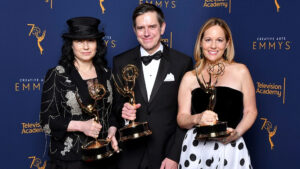
In 2017 the Primetime Emmy Awards first instituted their award for Outstanding Music Supervision. After concluding her work on the pilot episode of Mrs. Maisel, Robin Urdang was nominated for the second-ever music supervision Emmy Award in 2018 and won. She won two more in a row, for episode 204, “We’re Going to the Catskills!” and episode 305, “It’s Comedy Or Cabbage,” totaling 3 Emmy Awards in 3 years for her music supervision on The Marvelous Mrs. Maisel.
RU: I think it’s still kind of surreal. I won 3 Emmys and was nominated four times, which I couldn’t be more humbled by. The 3 Emmys sit on the top shelf behind my desk, and I always ensure they are hidden when I’m on Zoom calls. Never in a million years did I ever think that music supervisors would be eligible for the Emmys–though I believed they should be. Even more, I never thought I would be holding one–never mind 3. I have been working as a music supervisor for years, starting when music supervision was not a widely-known craft. There were only a handful or so of us. I am incredibly honored, grateful, and thrilled to receive such a gift.
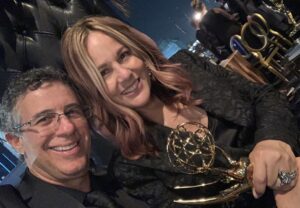
The Marvelous Mrs. Maisel, as a whole, has achieved the highest honors over its 5 seasons because of Amy Sherman-Palladino and Dan Palladino as it all comes from the top and trickles down. In addition to their talent, they bring in a team, a family of those who they trust and know will work darn hard. They have a way of pushing us farther than we believe we can go. Our executive producer, Dhana [Gilbert] held everything together, always with a smile and always caring. Matthew Shapiro (producer), who oversaw music and post, was my rock. The entire cast and crew worked together as we all wanted to make the show as best as possible.
Urdang explains how she began in music supervision and how that would go on to be a multiple award-winning career.
RU: I sort of fell into it. I was always very into music, but I was not a musician. I read books while listening to music and wondered why the music was wrong when the film came out, and it wasn’t playing Elvis Costello or Marvin Gay or Orleans or whatever I was listening to while reading. In college, I worked as a bartender in the busiest bar in the small town of New Paltz, New York, and was responsible for the playlist. When I graduated from college, I worked for a comedy and music management company in New York, ironically fitting into my world of Maisel. I loved the music, the production, the videos, and the soundtracks, and I continued to work in different areas of the music business. Music supervision was not a popular or well-known job at the time, but when I landed a job on The Mambo Kings as Robert Kraft’s assistant, my world changed. I knew I wanted to become a music supervisor. I taught myself everything I needed to learn, from music clearance to creative storytelling with music, soundtracks, composer deals, etc., and then I went off on my own.
What advice would you give your younger self or an aspiring music supervisor?
RU: I honestly think passion, listening, learning, and working as hard as possible are all of the utmost importance. Treat everyone fairly and kindly, whether they are an intern or the head of a company. Be smart and resilient, and enjoy!
What song makes even the worst day better for you?
RU: ‘These Days’ by Nico, ‘Rocket Man’ or anything by Elton John, ‘Reasons’ or ‘September’ by Earth, Wind & Fire. After thinking, maybe these are because I went to a 60s party recently, but for some reason, they played 70s music. I should have done the playlist for them!
What’s your favorite TV show (other than your projects)?
RU: I haven’t had time to watch too many shows and have a lot of catching up to do. I loved The Last of Us and Hacks. I had mixed feelings about The White Lotus, but I can definitely say that it sucked me in. And, of course, Schitts Creek!
Thank you, Robin, for sharing this insight into the music of The Marvelous Mrs. Maisel and your career in music supervision! Be sure to check out the final episodes of The Marvelous Mrs. Maisel, available now on Prime Video.
Check out Tunefind to download or purchase your favorite songs from the award-winning soundtrack and give a listen to the official Tunefind Spotify playlist that includes ten of the fan favorite songs along with Robin Urdang’s favorites mentioned here.
